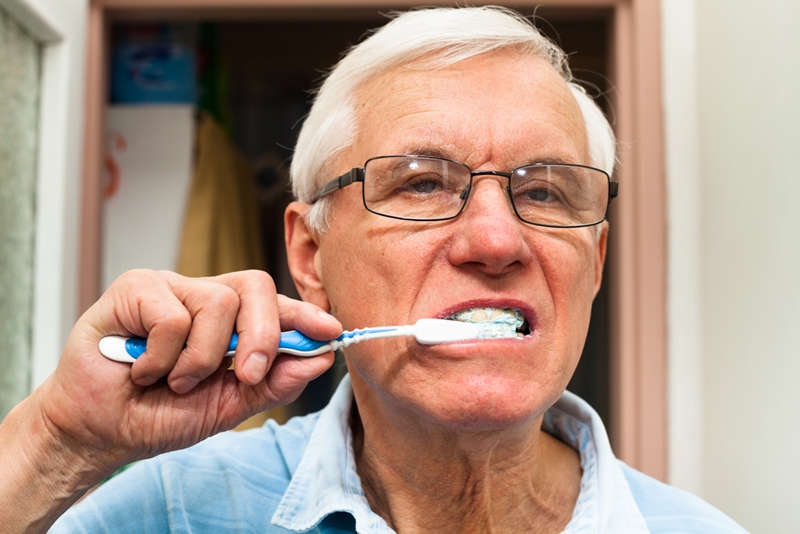
Falling on May 25, 2015, Memorial Day is set aside to salute the many men and women who have died serving our country. The history of the holiday comes out of reflection on the Civil War, and there have been many conflicts that have plagued the U.S. since then, meaning many honorable veterans are in our midsts. This day serves not just to memorialize the fallen but to also recognize the brave members of the military who are still with us.
Many of these veterans are senior citizens, and as a demonstration of gratitude, this article focuses on the dental health of this age group. Adults ages 65 and older did not have access to the same dental care services and resources as kids do today, especially when it comes to fluoride. Fluoride is popular in dental hygiene products like toothpaste and mouthwash, but it wasn't so readily available in the years immediately following 1946 - the year that begins the birth range for the baby boomer generation. Additionally, time in of itself can take a toll on teeth, which puts seniors at even greater risk for dental health issues. Therefore, there is a vital need for dental care for senior veterans.
Age-related illnesses
Many ailments that are common with old age can affect a person's teeth. Diabetes, which is marked by high glucose levels in the blood, can be especially problematic for oral health in seniors. Combining both diagnosed and undiagnosed numbers, diabetes affects 25.9 percent of adults age 65 and older.1 For these seniors, the higher glucose levels in their blood allows plaque to grow on the teeth, which can lead to cavities, tooth decay and gum disease.2 Additionally, they are more prone to mouth infections, thrush and dry mouth.3
"Diabetes can be especially problematic for oral health in seniors."
Those with diabetes can combat this problem by having a diligent daily oral hygiene regimen and taking the necessary steps to control the glucose levels in their blood. Since they are more susceptible to plaque growth, it is also imperative that they visit the dentist at least every six months, or more often if necessary. Additionally, seniors should let their dentists know they have this condition and what medications they are taking.
Effects of increased medication
A reduction in saliva production is a side effect of many prescription and over-the-counter medications. Because of this, dry mouth is a problem for over 30 percent of older adults.4 Usually, one can tell when they have dry mouth, as the symptoms are noticeably uncomfortable. However, for those not as in tune with their bodies, they should know the common signs of dry mouth: cracked lips, difficulty swallowing, rough tongue, sticky sensation in the mouth and a dry feeling in the throat. These symptoms can be immediately treated by sipping water, chewing sugarless gum or by using certain over-the-counter mouth rinses. Additionally, the physician can switch the dose or type of medication to counter this side effect. However, if dry mouth is neglected, it can cause serious problems for seniors that can only be treated at the dentist's office. Aside from the tasting, chewing and speaking difficulties caused by this condition, dry mouth can also lead to dental decay and other harmful infections.
 Seniors must take extra care of their teeth.
Seniors must take extra care of their teeth.Time and teeth
Even aside from other bodily health issues, the mouth can have problems all on its own. Sensitivity is often increased in seniors. Typically, enamel protects teeth from reacting to hot, cold and sweet foods. As we age, our gums recede, exposing parts of our teeth that are not protected with enamel.5 Therefore, for many seniors, it can be painful to indulge in things like cold ice cream or hot coffee. They can combat these issues by using toothpaste for sensitive teeth, but they should also keep an open conversation with their dentists. Sensitivity may be a sign of a cracked tooth or cavity, so it should not be disregarded as just a receding gum line.
Tooth loss is another element of oral health that often occurs with age. In fact, approximately 40 percent of adults in the U.S., Europe and Japan suffer from loss of natural teeth, otherwise known as edentulousness.6 In this situation, many seniors opt to use dentures or dental implants to replace the missing teeth. This helps them chew and bite normally, and it can also improve appearance. While the use of these dental fixtures has its benefits, they also need to be cleaned and maintained. Seniors should speak with their dentists about how to properly care for their dentures and dental implants.
Age-related issues present many problems for seniors, for both their oral health and overall well-being. It's important for seniors to regularly go to the dentist to stay on top of these issues and prevent further damage. Encourage your parents, family and friends to schedule an appointment.
1. "Statistics About Diabetes," American Diabetes Association, June 10, 2014. http://www.diabetes.org/diabetes-basics/statistics/
2. "Prevent Diabetes Problems, Keep your Teeth and Gums Health," Colgate. http://www.colgate.com/app/CP/US/EN/OC/Information/Articles/Oral-and-Dental-Health-Basics/Medical-Conditions/Diabetes-And-Other-Endocrine-Disorders/article/Prevent-Diabetes-Problems.cvsp
3. "Frequently Asked Questions," American Diabetes Association. http://www.diabetes.org/living-with-diabetes/treatment-and-care/oral-health-and-hygiene/oral-health-faqs.html#Q4
4. "Seniors Oral Health," Washington Dental Service Foundation. http://seniorsoralhealth.org/?doing_wp_cron=1431636249.9994370937347412109375
5. "Oral Health for Seniors," Colgate. http://www.colgate.com/app/CP/US/EN/OC/Information/Articles/Oral-and-Dental-Health-at-Any-Age/Seniors/Senior-Maintenance-and-Care/article/Oral-Health-for-Seniors.cvsp
6. "Senior Oral Health," American Dental Hygienists' Association. https://www.adha.org/resources-docs/7255_Senior_Oral_Health.pdf
